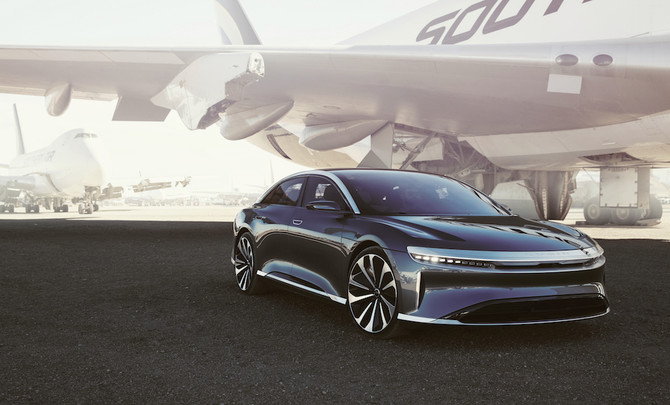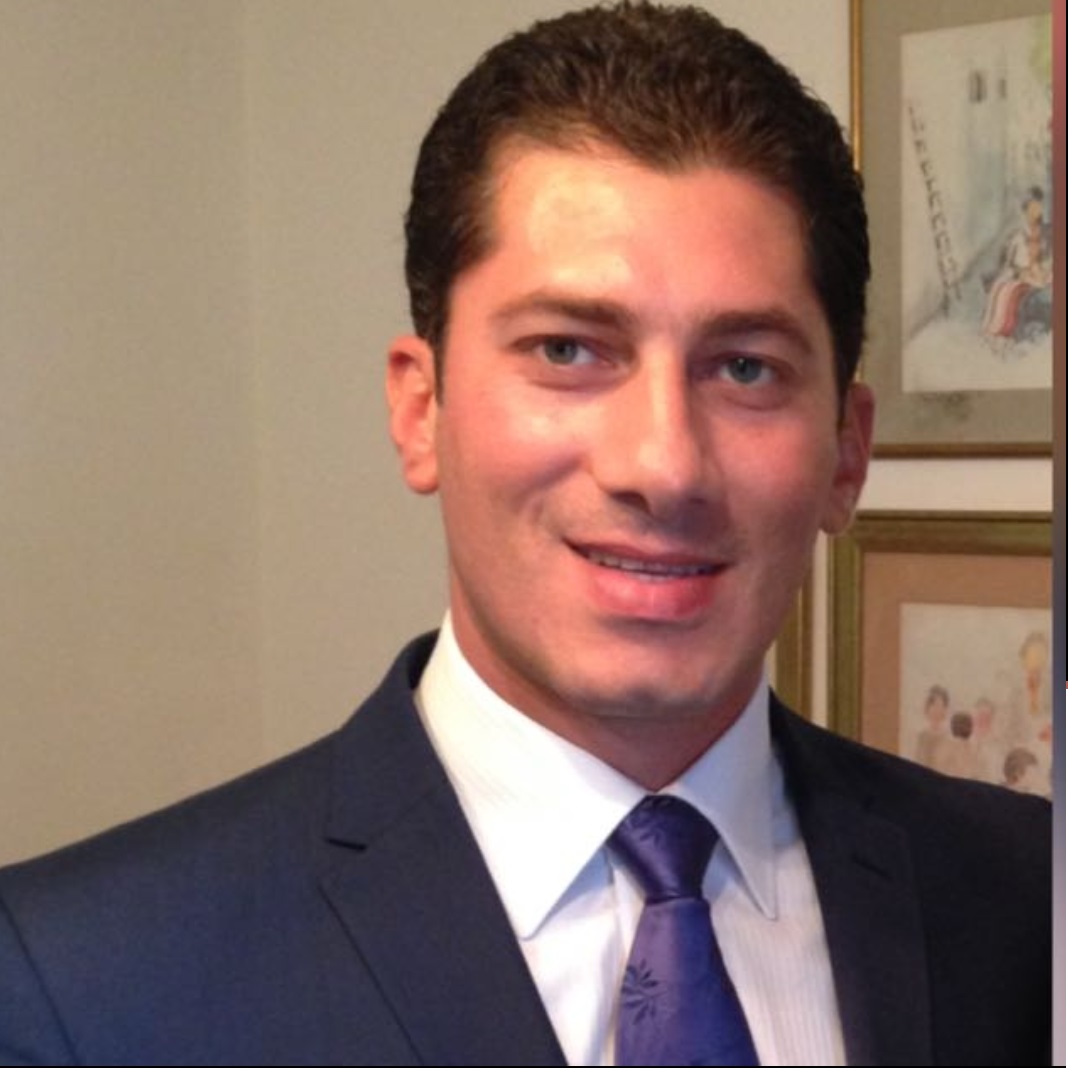LONDON: For Lucid, one thing is clear: The US electric-vehicle company aims to build the “best car in the world.”
It certainly faces a lot of competition in that regard, given the raft of startups specializing in electric cars that have emerged in recent years, and Elon Musk’s Tesla being streets ahead in the mass-production race.
But Peter Rawlinson, chief technology officer at Lucid Motors, said that the company is catering to a swankier, “true luxury” market — with an investment of more than $1 billion from Saudi Arabia’s Public Investment Fund (PIF) helping to drive its first electric car into production. The California-based company hopes to sell the Lucid Air for “well north of $100,000” in 2021.
“With the backing of PIF, (we can) propel the whole world toward a more sustainable mode of transport,” said Rawlinson.

“I’m sure that the people of Saudi Arabia will really take to the Lucid brand and Lucid products. We have a car which is very advanced in many ways and is taking electrification to the next step in a way that Tesla hasn’t.”
The investment from PIF is about much more than just getting the first cars off the production line, however. It is a “long-term” partnership, with a car factory in Saudi Arabia under consideration, said Rawlinson.
The engineer, who previously worked at rival Tesla, said that the financial backing from PIF, announced last year, will fund the $240 million cost of building the first phase of its factory in the US, and help to roll out Lucid’s store network and service support.
The factory will occupy a 500-acre plot in Arizona, and be dedicated to Lucid’s all-electric cars.

“The first phase will allow (for) up to 20,000 units per annum. But longer-term, that factory can be expanded over 500 acres to build nearly 400,000 vehicles per year, and that is our long-term plan,” said Rawlinson.
“It’s all been made possible by the over $1 billion investment from the Public Investment Fund of Saudi Arabia … It’s a long-term partnership, it’s a long-term strategic play.”
The investment from PIF won’t be a one-way street. As with some other investments made by Saudi Arabia, the deal with Lucid is also likely to see benefits on the ground in the Kingdom. This could include an electric-car production facility in Saudi Arabia — which is significant, given that currently most cars sold in the country are imported.
“I can see a really bright future, with a tangible manufacturing facility or facilities,” Rawlinson said. “We’d love to do that (in Saudi Arabia). We’re currently in a period where we are investigating all these options.”
Rawlinson, who is British but based in the US, added that it is “early days” for such a plan, but said that he sees many opportunities for electric vehicles in Saudi Arabia — not least, because of the abundant sunshine and potential for solar power.
“Through that alliance (with PIF) we are currently working on potential partnerships and activities where we can enhance the economy of the Kingdom of Saudi Arabia in a very positive way,” he said.
------
READ MORE: Tesla rival Lucid Motors wants to build factory in Saudi Arabia
-------
“We can help the Kingdom of Saudi Arabia move toward their 2030 vision and become less dependent upon their oil reserves and introduce sustainable technologies into their economy which will really benefit the country as a whole and provide many high-tech jobs.
“Also we have a partnership which extends to providing career opportunities here in Silicon Valley for some of the cream of Saudi university students, particularly in the areas of mechanical engineering … through an exchange program that we’re putting in place.”
Rawlinson sees a “very significant” market in Saudi Arabia, despite electric cars having made few inroads in the Kingdom so far.
“When Lucid Air comes along, people will see the full manifestation of what is possible with an electric car,” he said.

But bringing an electric car — or any car — into the market is an extremely tough task for a startup. And it is an increasingly crowded space, with the likes of Faraday Future, the China-based Byton, Michigan’s Rivian and Workhorse all specializing in electric cars, along with many of the big mainstream auto makers.
Even Tesla has struggled to get cars built, with Elon Musk famously describing the “production hell” that his company has faced.
Rawlinson said that Lucid has one key advantage over its peers: The proprietary technology behind its “powertrain” — basically, the components that make the car’s wheels turn — and the company’s 300-odd patents.
“The Public Investment Fund are pretty shrewd investors, pretty canny. And they did a very thorough survey of the entire market, and very, very intelligent, probing due diligence, as you would expect,” Rawlinson said.
“A key reason why they selected Lucid was our world-class electric powertrain technology … You cannot buy a motor as advanced as ours. Tesla’s motors are not as advanced as ours. They’re world-class.
“Another reason was the alignment with the management team’s vision for making the very best car in the world.”

The Lucid Air certainly packs a punch: It has a range of some 400 miles — more than the 310 miles of the top-spec Tesla Model 3 — and reached a terrifying 235 miles per hour in tests.
Next steps include making 80 beta prototypes of the car, or parts of it, before building the factory and starting production at the end of 2020.
It will be priced “well north of $100,000” to begin with, Rawlinson said, although the price could eventually be brought down to around $60,000 for lower-spec versions.
Lucid positions itself squarely in the super-luxury market, with the Air model seen competing with the likes of the Mercedes-Benz S-Class. The Lucid Air is the company’s first car, but Rawlinson said that an initial public offering (IPO) could happen in years to come, to fund development of future models.
“Sometime in the future, in the next few years, once we’ve got the car into production, maybe we show a second product … when we feel that the moment is right, an IPO is very much part of that future landscape,” Rawlinson said.

The engineer brushed off the idea of a competitive threat from Elon Musk’s Tesla, where he once worked as chief engineer for the Model S.
“We don’t see Tesla as a key, direct competitor. We see the German gasoline cars — the petrol engine cars … as our core competitive set,” he said.
“I’ve spoken to many people … who would gladly buy an electric car but say they’re not going to give up their Mercedes-Benz to buy a Tesla because of the interior. You’ve only got to step inside a Tesla to realize it’s not true luxury.”
Elon Musk would probably disagree with that — but it is the opinion of the monied car-buyers of the future that will be key to Lucid’s success.




























